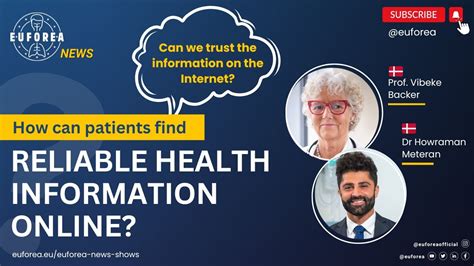In today's digital age, the internet has become a primary source of information for many of us. When it comes to our health, we often turn to online resources to learn more about a specific medical condition, understand treatment options, or simply to get advice on maintaining a healthy lifestyle. However, with so much information available online, it can be challenging to separate fact from fiction and find reliable medical information.
The Importance of Reliable Medical Information

Reliable medical information is crucial for making informed decisions about our health. It helps us understand our conditions, make informed treatment choices, and avoid potential health risks. Moreover, reliable medical information can also help us navigate the complex healthcare system, communicate effectively with healthcare professionals, and advocate for ourselves and our loved ones.
The Challenges of Finding Reliable Medical Information Online
Finding reliable medical information online can be a daunting task. With so many websites, blogs, and social media platforms offering health advice, it's easy to get overwhelmed by the sheer amount of information available. Moreover, not all online sources are created equal, and some may provide inaccurate, outdated, or biased information.
One of the main challenges of finding reliable medical information online is the lack of regulation. Unlike traditional media outlets, online sources are not always held to the same standards of accuracy and accountability. This means that anyone can create a website or social media account and start dispensing health advice, regardless of their qualifications or expertise.
Another challenge is the complexity of medical information. Health topics can be nuanced and multifaceted, and online sources may oversimplify or misrepresent the information. This can lead to confusion, misinformation, and potentially even harm.
Evaluating Online Sources of Medical Information
So, how can we evaluate online sources of medical information to ensure that we're getting reliable and accurate information? Here are some tips to help you get started:
- Look for credentials: Check if the website or author has any medical credentials or expertise. Are they a qualified healthcare professional or a reputable organization?
- Check the date: Make sure the information is up-to-date and not outdated. Medical knowledge is constantly evolving, so it's essential to ensure that the information you're getting is current.
- Evaluate the tone: Be wary of websites or authors that use sensational or emotive language. Reliable medical information should be presented in a neutral and objective tone.
- Check for peer review: Peer-reviewed articles and websites have been reviewed by experts in the field before publication. This helps ensure that the information is accurate and reliable.

Using Trusted Online Resources
While evaluating online sources can be time-consuming, there are some trusted online resources that can provide reliable medical information. These include:
- National Institutes of Health (NIH): The NIH is a trusted source of medical information, providing accurate and up-to-date information on a wide range of health topics.
- Centers for Disease Control and Prevention (CDC): The CDC is a reliable source of information on infectious diseases, vaccines, and other public health topics.
- Mayo Clinic: The Mayo Clinic is a reputable healthcare organization that provides accurate and trustworthy information on various health topics.
How to Use Online Resources Effectively
While online resources can be a valuable source of medical information, it's essential to use them effectively. Here are some tips to help you get the most out of online resources:
- Use specific keywords: When searching for medical information online, use specific keywords to get relevant results. Avoid using broad terms or vague language.
- Use reputable search engines: Use reputable search engines like Google Scholar or PubMed to find academic and peer-reviewed articles.
- Evaluate the results: Evaluate the search results carefully, looking for websites and authors that meet the criteria outlined earlier.

The Role of Healthcare Professionals
While online resources can provide valuable information, they should not replace the advice of a qualified healthcare professional. Healthcare professionals have the training, expertise, and experience to provide personalized advice and guidance.
If you're concerned about a specific health issue or have questions about a medical condition, it's essential to consult with a healthcare professional. They can provide you with accurate and trustworthy information, as well as help you navigate the healthcare system.
Conclusion
Finding reliable medical information online can be challenging, but it's not impossible. By evaluating online sources carefully, using trusted online resources, and consulting with healthcare professionals, you can make informed decisions about your health.
Remember, reliable medical information is crucial for maintaining good health and making informed decisions about your healthcare. Don't be afraid to ask questions, seek advice from healthcare professionals, and use online resources effectively.
Gallery of Medical Information Resources





FAQs
What are some reliable online resources for medical information?
+Some reliable online resources for medical information include the National Institutes of Health (NIH), the Centers for Disease Control and Prevention (CDC), and the Mayo Clinic.
How can I evaluate online sources of medical information?
+To evaluate online sources of medical information, look for credentials, check the date, evaluate the tone, and check for peer review.
Why is it important to consult with a healthcare professional?
+Consulting with a healthcare professional is essential because they have the training, expertise, and experience to provide personalized advice and guidance.
